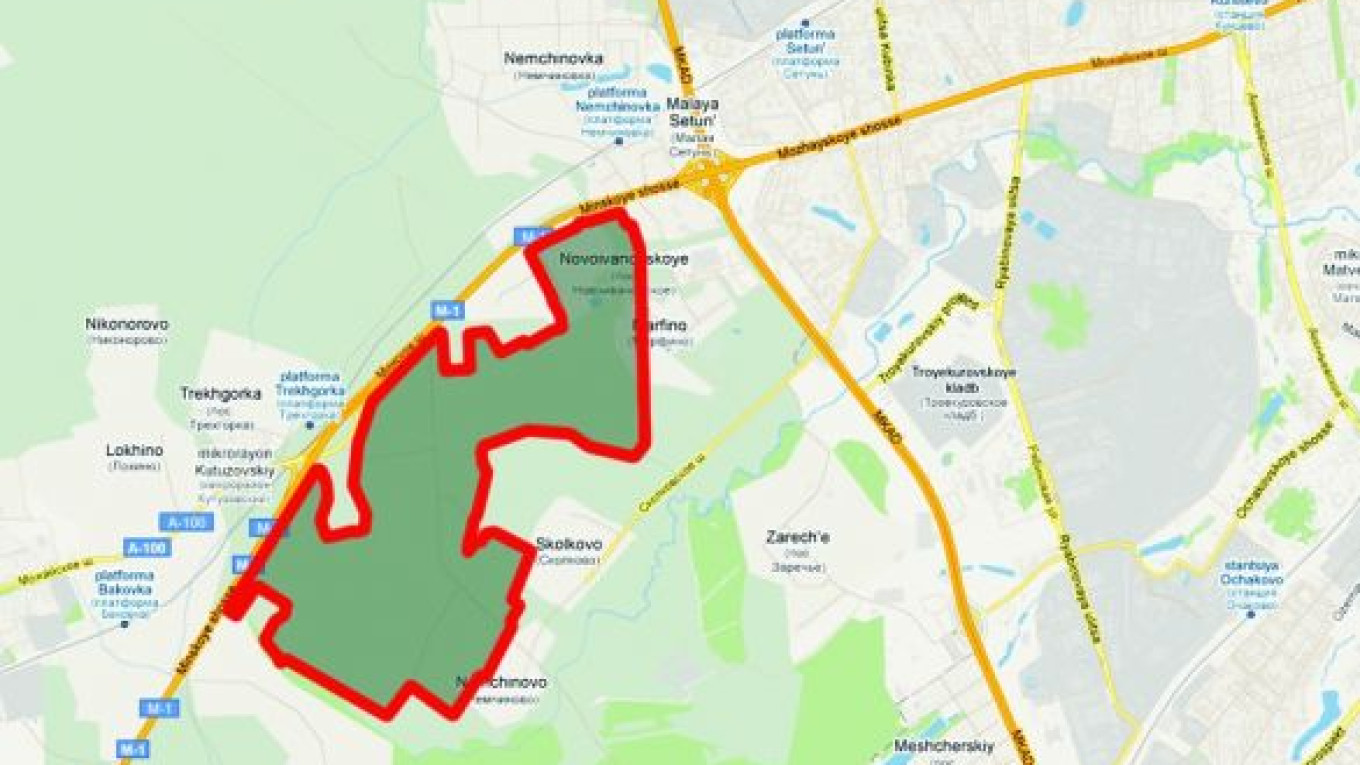In addition to state land, the Skolkovo innovation city could be built on property belonging to billionaire Roman Abramovich and possibly Olga Shuvalova, the wife of First Deputy Prime Minister Igor Shuvalov.
The center will require about 600 hectares, according to documents from the government commission on developing residential construction, copies of which were obtained by Vedomosti.
To start construction, the project needs 375 hectares, and President Dmitry Medvedev has ordered that the land be allotted by Dec. 31. A decision has already been made on three plots — of 78.3, 4.3 and 3.7 hectares — that belong to the state agricultural research institute Nemchinovka, a source in the presidential administration said.
Viktor Shtyrkhunov, the institute's deputy director, confirmed the decision.
The rest of the land owned by the institute and the Nemchinovka federal state unitary enterprise will also be seized, said Alexander Braverman, director of the Fund for Cooperation on Developing Residential Construction, which is gathering the land for the Skolkovo project.
But 375 hectares is not enough, especially since the "crooked" layout of the plots complicates their use, said a spokesperson for the Skolkovo Development Foundation. Roughly twice that much land will ultimately be needed, one of Vedomosti's sources said.
Along the perimeter of the territory so far are another 24 plots comprising 196 hectares, according to the commission documents. The land could be next in line for inclusion in the development, said the presidential administration source.
Nearly half of the land — 78 hectares to the right of Skolkovskoye Shosse, when driving from Moscow — belongs to the firm Gloria. The company's chief executive is Marina Goncharova, who is also president of Abramovich's foundation Pole of Hope.
Gloria is controlled by Abramovich, and a golf course is being built on the land, said John Mann, the spokesman for Abramovich's holding company Millhouse Capital.
Mann said the land was not part of the Skolkovo project and that he was not aware of plans to include it in the Skolkovo center.
Another 15.4 hectares to the right of Skolkovskoye Shosse belongs to the firm Zarechenskiye Dachi, which is fully owned by Vartan Galustyan, according to the uniform state register of legal entities.
He and Shuvalova each own 50 percent of the firm Zarechye-Development, which shares a telephone with Zarechenskiye Dachi.
Vedomosti's questions to both companies were answered by Yekaterina Muratidis, chief executive of Zarechye-Development. She said Zarechenskiye Dachi was using its 15 hectares for its own development and that the company was not considering any proposals on participating in the construction of the Skolkovo innovation hub.
Muratidis declined to comment on the companies' owners.
A spokesman for Shuvalov's office declined to comment on his wife's land near Skolkovo. The first deputy prime minister has already published everything that he is required to disclose about his relatives on the government web site, the spokesman said.
Another major neighbor is the firm Matveyevskoye, which has 54.6 hectares in the Nemchinovo district. An employee at the company said two plots — of 40 and 7.6 hectares — were zoned for agriculture, while 6.4 hectares have been cleared for rezoning to build dachas.
"No one has spoken to us. We don't know anything about plans to take the land for construction of an innovation center," the employee told Vedomosti.
Alexander Averin, chief executive of Kraft-Kontinental (4 hectares), and an employee at Lamaks (2.5 hectares) were also unaware of such plans. People who answered the phones of the directors of Sivma (8.5 hectares of warehouses space) and Khozdvor (0.35 hectares) could not comment on the matter.
The spokesman for the Polyot vacation retreat, which owns 14.5 hectares of adjacent forest and belongs to the Federal Property Management Agency, declined to comment.
Land in the Skolkovo district is worth $600,000 to $700,000 per hectare for agricultural land and $1.5 million to $1.8 million for residential land, said Vladimir Yefimov, commercial director of the firm Rodniye Zemli.
The property could only be seized if a special federal law were passed, like the one for the Olympics in Sochi, said Ilya Sviridov, head of the law firm Zemelnykh Del Kontora.
Last week, the State Duma passed in a first reading two bills on creating the Skolkovo innovation city.
When land is seized using eminent domain, the owner is compensated based on an independent appraisal of the property's market value. By agreement, the owner can also exchange the plot for another piece of land.
The Nemchinovka institute, for example, has already requested two plots in Mytishchi, northeast of Moscow, and the Naro-Fominsky district, southwest of Moscow, said the Kremlin official. The institute and its test fields may be relocated to the village of Tolstopaltsevo, also southeast of Moscow, said an official in a state body. An employee of the institute confirmed the information.
A Message from The Moscow Times:
Dear readers,
We are facing unprecedented challenges. Russia's Prosecutor General's Office has designated The Moscow Times as an "undesirable" organization, criminalizing our work and putting our staff at risk of prosecution. This follows our earlier unjust labeling as a "foreign agent."
These actions are direct attempts to silence independent journalism in Russia. The authorities claim our work "discredits the decisions of the Russian leadership." We see things differently: we strive to provide accurate, unbiased reporting on Russia.
We, the journalists of The Moscow Times, refuse to be silenced. But to continue our work, we need your help.
Your support, no matter how small, makes a world of difference. If you can, please support us monthly starting from just $2. It's quick to set up, and every contribution makes a significant impact.
By supporting The Moscow Times, you're defending open, independent journalism in the face of repression. Thank you for standing with us.
Remind me later.


